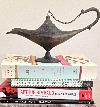HIROSHIMA'S SHADOW
WRITINGS ON THE DENIAL OF HISTORY AND THE SMITHSONIAN CONTROVERSY
EDITED BY KAI BIRD AND LAWRENCE LIFSCHULTZ
✒
Hiroshima's Shadow is easily the best overview of the most debated event in our stormy history and, best of all, every voice is heard — Gore Vidal
READERS OF THIS COLLECTION will be compelled to reevaluate their understanding of the history and politics underlying the decision to use atomic weapons on Hiroshima and Nagasaki. Kai Bird and Lawrence Lifschultz bring together a distinguished group of international historians and writers (including six Nobel Prize recipients) whose careful research has pierced the rationales for the atomic bombing presented by the Truman administration following the annihilation of the civilian populations in both cities.
Important elements of this research were an integral part of the Smithsonian's Enola Gay exhibit at the Air and Space Museum in Washington, D.C. commemorating the 50th anniversary of the use of nuclear weapons over Japan. The exhibit was first censored and then cancelled despite the condemnation of the Organisation of American Historians which "deplored threats by the members of Congress to penalize the Smithsonian because of the controversial exhibition on World War II and the dropping of the atomic bomb."The motives of those who were determined to use an atomic weapon regardless of alternatives are examined in this volume, as is the criticism of its use by Americans ranging from General Dwight Eisenhower and Admiral William Leahy to Reinhold Niebuhr, Norman Thomas, and the Federal Council of Churches.
In his preface, Joseph Rotblatt, recipient of the 1995 Nobel Peace Prize and the only scientist to leave the Manhattan Project, recalls his dramatic encounter at Los Alamos with the project's director, General Leslie Groves. After learning that the Germans had abandoned their bomb effort, Rotblatt was told by Groves that the project would continue and real purpose of the bomb was to subdue the Soviet Union.
This collection includes a comprehensive set of key historical documents, including the July 17the Petition of 155 Manhattan Project scientists who appealed to Truman not to use an atomic weapon against Japan. It is published for the first time with the names of all its signatories.
Photographs by Yosuke Yamahata, the Japanese photographer who entered Nagasaki the morning after the atomic bombing, appear throughout the volume. Shuntaro Hida, Tamiki Hara, and Hideko Tamura Snider who survived the bombing of Hiroshima are remember "the day Hiroshima disappeared." Their stories demonstrate the enduring reality that ordinary citizens—not military objectives—were then, and still are, the prime target of nuclear weapons.
An epilogue presents the World Court's opinion on Nuclear Weapons and Humanitarian Law.
HISTORIANS AND SCHOLARS whose work is included in this volume: Gar Alperovitz, Murray Sayle, Wilfred Burchett, William Lanoutte, Barton Bernstein, Henry Stimson, Paul Fussell, John Rawls, and Martin Sherwin, among others.
THE FIRST CRITICS: Paul Boyer, Joseph Rotblatt, Mahatma Gandhi, Albert Camus, Lewis Mumford, Mary McCarthy, and Norman Cousins, among others.
The Editors
KAI BIRD is a contributing editor for The Nation and author of several critically acclaimed books including, with Martin Sherwin, the Pulitzer prize winning American Prometheus: The Triumph and Tragedy of Robert J. Oppenheimer.
LAWRENCE LIFSCHULTZ has been the South Asia Correspondent of the Far Eastern Economic Review . He has also written extensively on Asian and European affairs for the The Guardian, Le Monde Diplomatique, the BBC, and The Nation.


